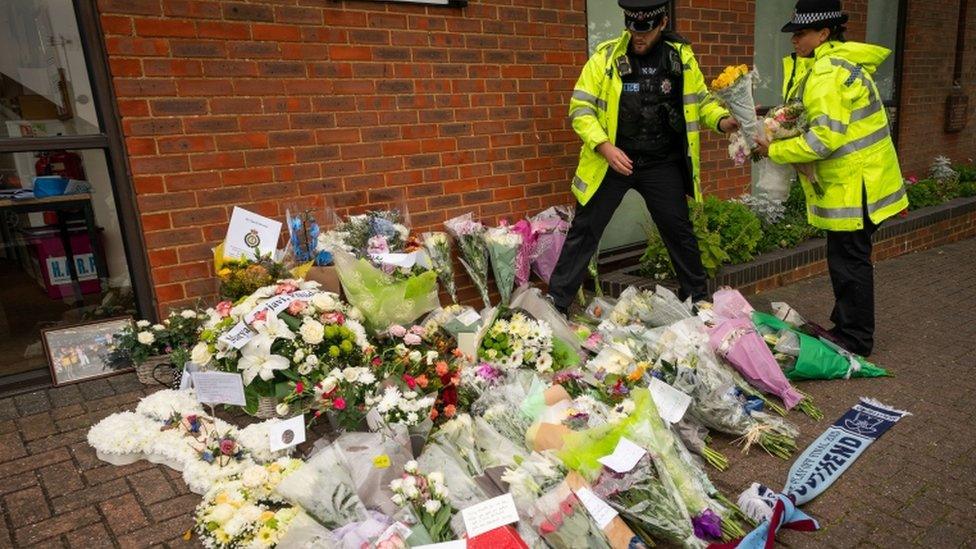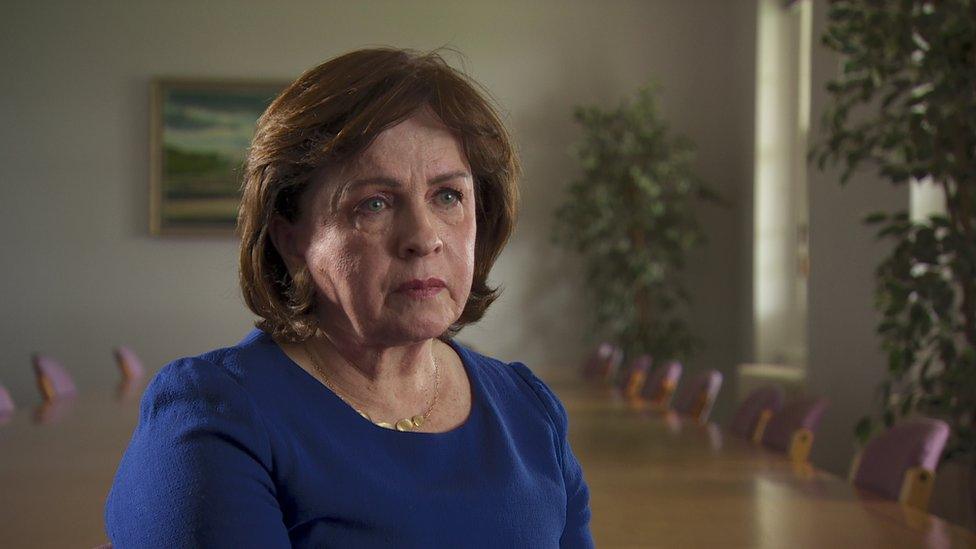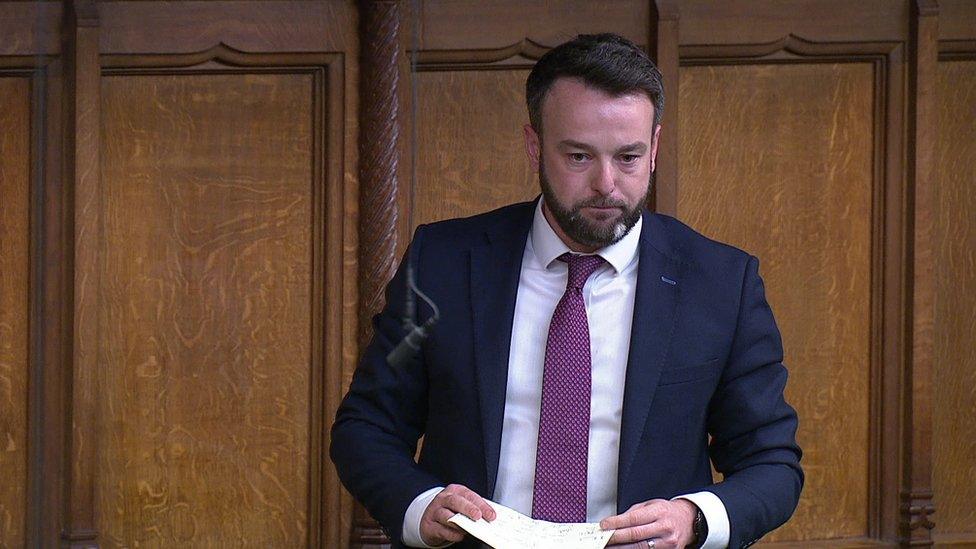Northern Ireland MPs and MLAs advised on security
- Published

Police officers arrange flowers and tributes outside Belfairs Methodist Church in Leigh-on-Sea, Essex, where Conservative MP Sir David Amess was killed
Every MP in the UK - including 18 in Northern Ireland - is being contacted by their respective local police forces after the murder of Sir David Amess.
It is part of an ongoing national initiative around the security of politicians known as Operation Bridger established in 2016.
PSNI Chief Constable Simon Byrne and Assistant Chief Constable Mel Jones began calls over the weekend.
This will also be extended in comings days to Northern Ireland's 90 MLAs.
By Monday lunchtime, about half of them were believed to have been contacted by area police commanders.
The PSNI said they will be "providing crime prevention and personal security advice on an ongoing basis".
Swann: 'Small cohort' intent on causing politicians harm
Politicians are being asked to report any concerns they have immediately.
But there are no significant threats known of currently.
One politician told BBC News NI: "I was simply asked if there were any issues. It was a call of superficial reassurance."
Historically, Northern Ireland's elected representatives have gone about their work mindful of security, given the Troubles and more recent periods of civil disorder.
MPs Robert Bradford, Airey Neave and Ian Gow were murdered by republicans between 1979 and 1990.
During the loyalist flags protest in 2012-13, Alliance leader Naomi Long received death threats and her office was attacked.
On Monday, the DUP's Diane Dodds talked about an IRA attempt on the life of her husband Nigel while the couple visited their seriously ill son at the Royal Victoria Hospital in Belfast in 1996.
She said staff at the hospital had noticed men wearing wigs acting suspiciously.
"They put us into a small anteroom and when I say put us in, I mean we were shoved in one direction, police stood in the corridor and one nurse who came up to tell us of the danger was almost thrown to the floor," she told BBC News NI.
"And then we heard the gunshots and pretty much pandemonium in the hospital.
"There were other children there that night who were incredibly ill and all this was happening when the nurses and doctors were trying to attend to them."

Diane Dodds recalled "pandemonium" in a hospital attacked by the IRA while she and her husband visited their seriously ill son
One police officer was injured and a bullet passed through an incubator being prepared for a patient when the IRA gunmen opened fire.
She said the attack had happened during extremely dangerous times in Northern Ireland.
"I sometimes think we don't reflect or remember enough just how dangerous they were and how terrible they were," Mrs Dodds said.
"It's terrible to think of what happened to David Amess, it's terrible to think what happened to Jo Cox, but this has been happening in Northern Ireland - this happened to the Rev Robert Bradford, it happened to Edgar Graham and surely we must condemn that as much as condemn the David Amess killing."
Security cameras
One local politician once told me they had been issued with a personal protection weapon due to threats from paramilitaries.
Infrastructure Minister Nichola Mallon's office has been targeted by anti-vaccine protesters
No Northern Ireland MP has a police protection officer - but the deployment of a PSNI plain-clothes security detail does extend to the first minister and justice minister.
Some politicians' constituency offices and homes have security cameras paid for under Westminster or Northern Ireland Office schemes.
But not all of them.
Several politicians have been subjected to threats using social media.
These are often assessed as being low-level, but are always communicated to the individual via the PSNI nonetheless.
On Monday, SDLP deputy leader Nichola Mallon said she and Sunday Independent journalist Rodney Edwards had been sent a threat on social media which they had reported to the police.
Ms Mallon previously told BBC News NI her staff were "harassed and intimidated" last week.
Police confirmed they were contacted after a group of anti-vaccine protesters turned up at infrastructure minister Ms Mallon's constituency office, as first reported by the Sunday Independent.
An incident was also reported at Sinn Féin MP John Finucane's constituency office in north Belfast on Monday morning.
Deputy First Minister Michelle O'Neill told the Northern Ireland Assembly one of her party's MPs "had to call the police to remove people from his office".
Mr Finucane said "workers and constituents should be able to get on with their business free from verbal abuse, harassment and intimidation".
Police said they received a report of protesters outside the constituency office of a political party in north Belfast on Monday, but "when officers attended, the small group had dispersed and no offences were detected".
On Sunday, Justice Minister Naomi Long said Simon Byrne had contacted MPs to discuss their security.
Related topics
- Published16 July 2021
